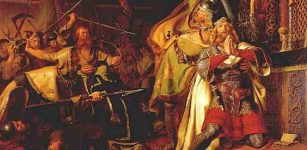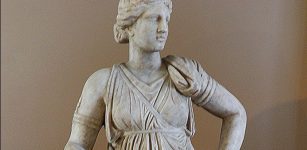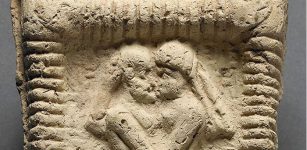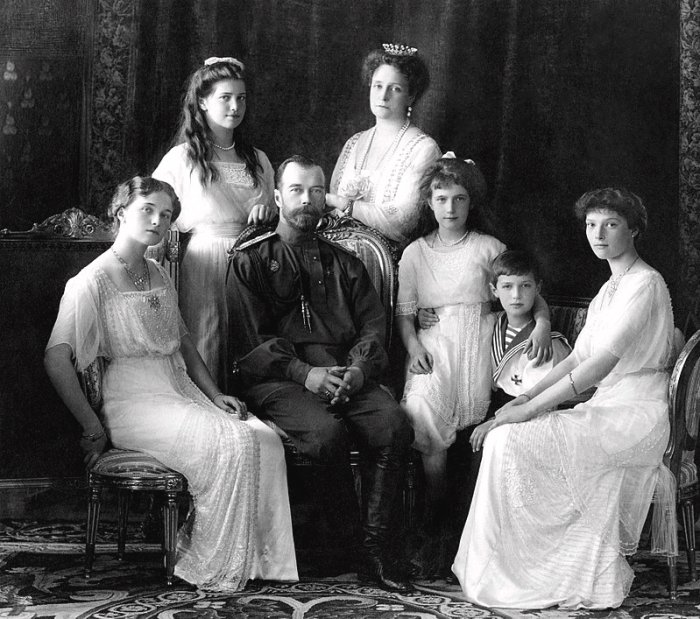Rasputin – Controversial Mystic With Healing Powers – An Evil Or Misunderstood Man?
Ellen Lloyd - AncientPages.com - Rasputin’s true story is a mix of lies and truths. When a man’s life story contains plots, controversies, intrigues, and rumors, it’s difficult to grasp how everything started and ended. We must rely on experts and books to get to the bottom of the mystery of Rasputin, but how far can we get?
With certainty, we can say that Grigori Rasputin was one of the most intriguing yet least understood historical persons in Russia. He strongly influenced the Tsar family, and his power led to his death.
Saint Petersburg, Russia Rasputin's murder at Yusupov Palace Rasputin was shot in this room. It is open for visitors at Yusupov Palace on the Moika River. Credit: Ninara - CC BY 2.0
It is said that he was a holy man, a prophet with healing powers, and killing him seemed almost impossible. Instead, he survived several assassination attempts before a group of conspirators brutally murdered him.
Was he an evil or misunderstood man?
Rasputin’s Early Years
The exact date of Grigori Yefimovich Rasputin is uncertain, but it’s assumed that he was born in the late 1860s. He was a child of a peasant family living in Siberia. It seems he was an uneducated boy, as his family did not have the funds or the desire to send young Rasputin to school. According to some historians, Rasputin never learned how to read and write, but author Colin Wilson, who wrote the book Rasputin and the Fall of the Romanovs, states that Rasputin “had little schooling; although his father taught him the rudiments of reading, he could see no point in learning to write. He hated discipline; he preferred fishing or swimming to sitting over books. (He never learned to write properly; letters in his handwriting show an awkward, childish scrawl.)"
He may have been a typical boy in those days, one who had some minor encounters with the law. Nevertheless, in the eyes of Praskovya Dubrovina, he was worthy enough to marry, and she bore him five children, though only three survived.
Rasputin supported them all by working on the family farm in the early years of their marriage. However, his interest in religion started him down the road, which would lead to fame and, eventually, his demise.
Rasputin Was Not A Monk But Religion Dominated His Life
Before Rasputin had the privilege of meeting the Tsar family, he spent many months in a monastery. Although he was referred to as a holy man, a mystic, and a mad monk, he never took the final vows to become a monk. To name him the Mad Monk is incorrect, but that was what his enemies called him. Rasputin made several trips to the holy land and sought out religious leaders in his search for God.
His strong personality and charisma influenced many who heard him. As his popularity grew, so did his supporters and, eventually, enemies. Rasputin had so many followers that he began building a little church to teach and preach with ease. But his view on religion became slightly twisted. Wilson revealed that the Russian mystic became “obsessed with asceticism and the idea of pilgrimagé.”
Rasputin’s Meeting With The Tsar Family And His Healing Powers
It took Rasputin some years before he came to the attention of Russia’s royal family. In 1903, Rasputin, often called the Wander, came to St. Petersburg. By now, he was a well-known mystic and faith healer. It was said that he possessed unusual healing powers.
Nicholas II of Russia with the family. Credit: Wikipedia
He had healed the family dog of one of the relatives of the Russian Tsar Nicholas II (1868 - 1918). News about this extraordinary mystic and the great gifts he held reached the Tsar, who decided in 1905 to invite Rasputin to join his royal court.
The Tsar family had a sick child who had hemophilia. Surely, Rasputin could help them cure the youngster, they thought.
The healing of the young boy is just one of the controversies that surrounded Rasputin. The stories range from him stopping the aspirin being administered to the young lad, to his laying on hands, to kneeling and praying for the boy, and finally to using peasant folk medicine.
We may never know what Rasputin did, but the child’s health improved, and he was cured. It’s no wonder that the grateful Tsar and his wife invited Rasputin to stay with them long-term. Rasputin became a close friend to the Tsar family, and the royal couple found comfort in his advice and counseling.
Rasputin Is Surrounded By Jealous People And A Murder Plot Is Developed
Fame and jealousy often go hand in hand. Rasputin was not immune to this fact.
When Rasputin’s rise in influence over the royal family became obvious, it created jealousy among Church leaders, government officials, and society's elite members. Because of this jealousy, several stories surrounding Rasputin may or may not be true. Rasputin suddenly became a target of all possible controversies and accusations. It was said he was a member of the Khylists, a group believing that to get close to God, they had to practice debauchery and other sins. His daughter Maria refuted that notion and said Rasputin rejected the sect and did not like their thinking.
One vicious rumor had Rasputin in a very lurid affair with the Tsar’s wife, Alexandra. Other rumors had him working with the Germans against the Russians and starting a cholera epidemic using imported Canadian apples. There seemed to be no ending to the accusations against Rasputin, but how much was true is difficult to determine today.
Wilson reminds all readers interested in Rasputin that “original source material is scanty. The Revolution came shortly after his death, and the historians of the Soviet government were more interested in denigrating Nicholas II than in historical accuracy. Most of the books about Rasputin that were published outside Russia were cheap sensational biographies that make no pretense of detachment.”
The Murder Of Rasputin
Despite the lack of proper information, most historians agree that a group of conspirators started to develop a plot to murder the Russian mystic. One of the main figures in the assassination plot was Prince Felix Yusupov (1887 – 1967), a Russian aristocrat who married the niece of Tsar Nicholas II.
When Rasputin survived several assassination attempts, people got scared, thinking this holy man must be immortal, but they were wrong.
In his book To Kill Rasputin: The Life and Death of Grigori Rasputin, author Andrew Cook describes how Rasputin, on the night of December 29, 1916, was invited to some would-be friends who wanted to murder him. Prince Yusupov and the Tsar’s first cousin, Grand Duke Dmitri Pavlovich gave Rasputin poison, but it did not affect him.
Felix Yusupov, one of the men behind the murder of Rasputin. Credit: Wikipedia
“Rasputin had eaten all the cakes and drunk two glasses of poisoned wine and ‘nothing has happened, absolutely nothing. Rasputin was belching and dribbling, but that was about it,” Cook writes.
The killers shot him several times, but to their astonishment, Rasputin survived and fled. But he didn’t get far. He was seriously wounded and fell in the snow-clad courtyard, and the great mystic knew death was inevitable. Rasputin died in the Moika Palace. His killers wrapped his body in a carpet and threw it into the Neva River, where it was discovered three days later. When examined by a coroner it was found that Rasputin had water in his lungs and was alive at the time he was thrown in the water.
Russians’ great mystic was gone. Some saw it as liberation. Others were sad. But Rasputin’s dead voice could still be heard through his prophecy. Shortly before he died, he wrote to the Tsar, telling him:”
“If I am killed by common men, you and your children will rule Russia for centuries to come; if I am killed by one of your stock, you and your family will be killed by the Russian people!”
—Rasputin”
Rasputin’s prophecy came true 15 months later. The whole Tsar family, the Tsar, his wife, and all their children were murdered by assassins during the Russian Revolution. Some suspected one of the daughters survived, Anastasia, and many women stepped forward, claiming to be the Tsar's daughter. No one could provide enough evidence.
Rasputin's life story remains incomplete. Credit: Public Domain
Was Rasputin a mad, evil charlatan, or was he a misunderstood man born ahead of his time? His life is colorful, and his personality captivates the public. Hundreds of books have been written about Russia’s greatest mystic. Yet, no one knows his true story. If you want to learn more about Rasputin, read some biographies, but remember they all present a slightly different story. You must create your own picture of this controversial historical person who has never been forgotten.
Written by Ellen Lloyd - AncientPages.com
Updated on March 10, 2024
Copyright © AncientPages.com All rights reserved. This material may not be published, broadcast, rewritten or redistributed in whole or part without the express written permission of AncientPages.com
Expand for referencesMore From Ancient Pages
-
 Unexplained Disappearance Of East Balkan Civilizations – Scientific Disagreement – Part 2
Civilizations | Apr 30, 2018
Unexplained Disappearance Of East Balkan Civilizations – Scientific Disagreement – Part 2
Civilizations | Apr 30, 2018 -
 Evidence Of 10,000 Years Of Violent Conflict Among The Hunter-Gatherer Societies In The Atacama Desert
Archaeology | Oct 2, 2023
Evidence Of 10,000 Years Of Violent Conflict Among The Hunter-Gatherer Societies In The Atacama Desert
Archaeology | Oct 2, 2023 -
 Llanbadoc Discovery: Late Medieval Artifact And The Battle Of Usk
Artifacts | Oct 2, 2018
Llanbadoc Discovery: Late Medieval Artifact And The Battle Of Usk
Artifacts | Oct 2, 2018 -
 Bizarre Parthian Tomb Sheds Light On Ancient Life In Isfahan, Central Iran
Archaeology | Jun 25, 2020
Bizarre Parthian Tomb Sheds Light On Ancient Life In Isfahan, Central Iran
Archaeology | Jun 25, 2020 -
 Illegal Gold-Hunting Diggers Damaged Sudan’s 2,000-Year-Old Historic Site
Archaeology | Aug 24, 2020
Illegal Gold-Hunting Diggers Damaged Sudan’s 2,000-Year-Old Historic Site
Archaeology | Aug 24, 2020 -
 Beehive’ Adobe Houses Of Ancient City Of Harran, Upper Mesopotamia
Civilizations | Dec 28, 2018
Beehive’ Adobe Houses Of Ancient City Of Harran, Upper Mesopotamia
Civilizations | Dec 28, 2018 -
 Thousand-Year-Old Sarcophagus Discovered In Odense
News | Sep 28, 2015
Thousand-Year-Old Sarcophagus Discovered In Odense
News | Sep 28, 2015 -
 Legend Of The Sun And Moon In Cherokee Beliefs
Featured Stories | Jul 9, 2019
Legend Of The Sun And Moon In Cherokee Beliefs
Featured Stories | Jul 9, 2019 -
 Mysterious Depiction Of Pharaoh Hatshepsut
Archaeology | May 17, 2018
Mysterious Depiction Of Pharaoh Hatshepsut
Archaeology | May 17, 2018 -
 Forbidden Antediluvian Egyptian Secrets Revealed By Initiated Masters Show Most We Know About Egypt Is Wrong
Featured Stories | Aug 6, 2020
Forbidden Antediluvian Egyptian Secrets Revealed By Initiated Masters Show Most We Know About Egypt Is Wrong
Featured Stories | Aug 6, 2020 -
 Neanderthals’ Lack Of Drawing Ability Could Explain Why Modern Humans Became Smarter
Archaeology | Feb 11, 2018
Neanderthals’ Lack Of Drawing Ability Could Explain Why Modern Humans Became Smarter
Archaeology | Feb 11, 2018 -
 Star-Shaped Magnetic Anomaly At Hidden Stone Circle In The Outer Hebrides Gives New Insight Into Ancient Beliefs
Archaeology | Jan 2, 2020
Star-Shaped Magnetic Anomaly At Hidden Stone Circle In The Outer Hebrides Gives New Insight Into Ancient Beliefs
Archaeology | Jan 2, 2020 -
 Goddess Artemis – One Of The Most Respected Olympians
Featured Stories | Oct 1, 2016
Goddess Artemis – One Of The Most Respected Olympians
Featured Stories | Oct 1, 2016 -
 Rare Ancient Leopard Painting Discovered On Sarcophagus In Aswan, Egypt
Archaeology | Feb 25, 2020
Rare Ancient Leopard Painting Discovered On Sarcophagus In Aswan, Egypt
Archaeology | Feb 25, 2020 -
 Clovis People Invented ‘Fluting’ Ancient Stone Weaponry
Archaeology | Apr 5, 2017
Clovis People Invented ‘Fluting’ Ancient Stone Weaponry
Archaeology | Apr 5, 2017 -
 New Hope To Finally Find Tomb Of Alexander The Great
Archaeology | Mar 6, 2019
New Hope To Finally Find Tomb Of Alexander The Great
Archaeology | Mar 6, 2019 -
 2,000-Year-Old Sundial Discovered In Ancient City Of Laodicea, Turkey
Archaeology | Mar 25, 2020
2,000-Year-Old Sundial Discovered In Ancient City Of Laodicea, Turkey
Archaeology | Mar 25, 2020 -
 Humanity’s Earliest Recorded Kiss Occurred In Mesopotamia 4,500 Years Ago – New Study
Archaeology | May 18, 2023
Humanity’s Earliest Recorded Kiss Occurred In Mesopotamia 4,500 Years Ago – New Study
Archaeology | May 18, 2023 -
 Codex Washingtonianus Contains A Passage Not Seen In Any Other Biblical Manuscript
Artifacts | Aug 4, 2015
Codex Washingtonianus Contains A Passage Not Seen In Any Other Biblical Manuscript
Artifacts | Aug 4, 2015 -
 Gigantic Ancient Palace Unearthed In Mexico’s Valley Of Oaxaca
Archaeology | Mar 29, 2017
Gigantic Ancient Palace Unearthed In Mexico’s Valley Of Oaxaca
Archaeology | Mar 29, 2017




